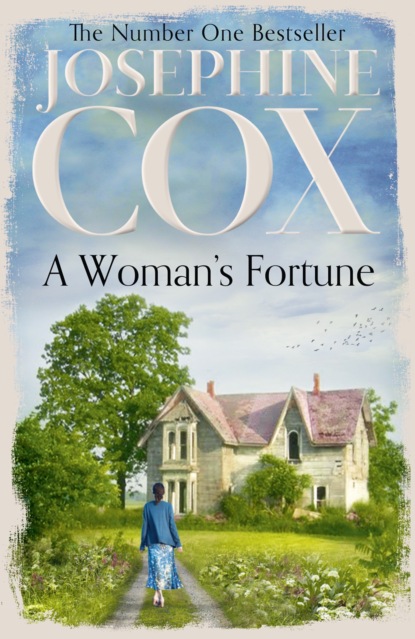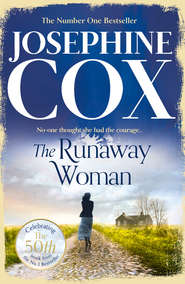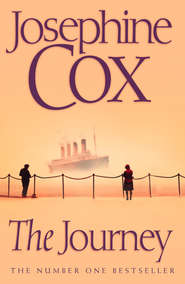По всем вопросам обращайтесь на: info@litportal.ru
(©) 2003-2025.
✖
A Woman’s Fortune
Автор
Год написания книги
2019
Настройки чтения
Размер шрифта
Высота строк
Поля
As Michael pulled the door to and posted the key back through the letterbox, the family moved towards the van and their neighbours went back over the road. Billy and Evie turned to one another for the last time.
‘Goodbye, Billy,’ said Evie, hugging him tight. ‘I’ll be in touch very soon, I promise.’
‘Bye, my Evie,’ Billy said, his voice raw with emotion. Then he bent down and kissed her mouth and their tears mingled.
‘Don’t forget me, will you?’ she pleaded.
‘I said I’ll be waiting,’ he reminded her as they drew apart.
‘I love you,’ Evie whispered, but he’d already turned away to hide his tears and she wasn’t sure he’d heard.
It was a terrible squash to fit everyone in the van, although there were big extra seats that folded down behind, sideways on to the front ones. Sitting there meant finding room for your legs around the luggage, however, so it was hard to get comfortable. Peter and Evie were sharing a seat and Robert had to sit on Jeanie’s knee. Fergus started the engine and all the Carters waved to their friends congregated outside the Sullivans’ house to give them a silent send-off.
Evie fixed her eyes on Billy’s face, but within a few seconds it was lost from her sight. The van turned the corner at the end of the road and Shenty Street was gone.
As Fergus happily negotiated the streets heading to the road that would take them south, the Carters sat nursing their regrets. Jeanie was openly sobbing and even Sue was tearful, which set off Evie, and Robert was crying, too. Michael was subdued but, wisely for once, decided to say nothing. Evie, squashed up beside Peter, took his hand in hers to comfort him, but when she looked into his face she saw not sadness but such fury that she felt a strange and terrible foreboding and withdrew her own hand in shock.
The van reached the southern outskirts of the town and the blackened industrial buildings gave way to houses with gardens and, soon, green fields. The Carters dried their eyes, made themselves as comfortable as they could and accepted the inevitable. The old life was gone and a new one, whatever it held, lay ahead of them at the end of this journey.
‘I still wish I’d been able to say goodbye to Mrs Russell,’ said Grandma Sue over her shoulder to Evie, who sat behind her. ‘And Dora Marsh. I’ve known Dora … must be forty years. We were young brides together.’
‘There are a lot of folk I’d like to have said goodbye to. Seems rude just to go, like they meant nothing to us,’ Jeanie agreed. She paused for a few moments and then added: ‘I wish I’d been able to say cheerio to Harold Pyke.’ Then she started laughing rather shakily and soon everyone joined in, even Robert, who didn’t know what was funny.
The mood lifted as they drove on and the sun rose higher on the promise of a beautiful day.
After a while Robert piped up: ‘I spy with my little eye something beginning with …’
Sue and Evie caught each other’s eye in the wing mirror and pulled faces. It was going to be a long journey.
‘Where are we?’ said Peter, waking from a deep sleep. Sue and Evie had also nodded off, and Robert was still asleep on his mother. ‘It must be the sight of those mattresses that sent me to sleep. They look so comfy compared to this seat.’
Everyone gazed out of the windows at the countryside they were passing through. In the strong summer sunshine the scene was glorious.
Evie wished she hadn’t slept and missed seeing some of this: on either side of the road hedges grew tall and green, dog roses twining through them. At breaks in the hedges, through field gates, she could see cows and sometimes horses grazing. It was all so huge and so green that she couldn’t quite believe her eyes.
‘Countryside – there’s just so much of it,’ said Peter. ‘I’d no idea it was so big.’
‘And the air smells different – sort of nice,’ said Sue, winding down the window.
They continued travelling south, amazed at how green everything was and how clean. Sometimes they passed through a town or village and Jeanie would point out a pretty house and wonder aloud if they were heading for one like that.
Eventually Sue looked at her watch and declared it was ‘dinnertime’ and if Fergus would like to find a suitable place to stop they could have something to eat. Fergus turned off the road in the next market town and pulled up in a car park where there was, everyone was pleased to see, a sign for public lavatories. The little town was quiet on a Sunday lunchtime and the shops were closed when Jeanie took her children for a short walk to stretch their legs after enduring the cramped seats.
When everyone was back at the van and standing around in the sun, Sue got out a cake tin, which was filled with rather warm sandwiches, and when they’d eaten those, another in which there was cake, and Jeanie poured lemonade from a flask. Michael produced a bottle of beer with a flourish, which Fergus declined to share because he was driving. Evie noticed that her father drank it all himself then.
The sandwiches and most of the cake eaten, the Carters and Fergus climbed back into the van and set off again. There was a stop at a petrol station, where Sue paid for the van to be refuelled and bought some boiled sweets, but by mid-afternoon the novelty of the journey had worn off and everyone was bored, fidgeting and eager to arrive. They had long since passed signs for the city of Birmingham and still they headed south.
‘Not too far now,’ said Fergus when Robert asked for the tenth time if they were nearly there. ‘We’ll be there before nightfall, don’t you worry.’
‘Thing is, Fergus,’ said Peter, reasonably, ‘it isn’t dark until nine o’clock, so that’s quite a long time yet.’
‘It could well be,’ said Fergus, vaguely. ‘We’ll have to see how it goes …’
‘Do you know what this place is like, Fergus? Have you ever been there before?’ asked Jeanie.
‘No, I haven’t, Jeanie. I just said to Brendan that I’d take you in the van. I think it might be quite a small village as I’ve never heard of it and I had to look up the way on a map. I don’t think Brendan knows much about it either. But he trusts his friend Jack Fletcher so it’ll be all right, don’t you worry.’
‘But it is all right for us to be there?’ asked Jeanie, beginning to get anxious. ‘We don’t know this Jack Fletcher, and Brendan’s a long way away now.’
Seeing Jeanie quietly wringing her hands, Evie picked up her mother’s mood and began to worry too. What if there had been a mistake and there wasn’t an empty house after all? What if someone else was living there? Or maybe there’d been a mix-up and they’d been given the wrong address? Or he could have been misled by the owner of the house …
Peter, sensing her distress, nudged her gently with his elbow. ‘C’mon, Evie, it might even be nice,’ he whispered bravely.
It was late afternoon when Fergus drove past a shabby-looking farm and slowed down at a sign announcing a village.
‘Here we are,’ he said. ‘Church Sandleton.’
Everyone sat up and peered out to try to get the gist of the place. There was an assortment of old and new houses lining the road, a pub and a couple of shops.
‘Slow down, Fergus, and let’s remind ourselves what it is we’re looking for,’ Sue said, fishing the writing pad out of her handbag. Then she had a rummage around for her reading glasses and Fergus pulled into the side of the road while she found them and put them on. ‘The house we’re looking for is called Pendles, so keep your eyes peeled for that name,’ she said.
‘Pendles …’ Michael murmured, looking to the right and left, while Evie, Peter and Jeanie craned forward in their seats to see the nameplates on gates as Fergus drove slowly on.
Jeanie caught sight of a cottage with a garden full of blooming roses and lavender. ‘Slow down, Fergus. Is that it?’ She squinted hopefully at the sign on the gatepost, then saw it said Lavender Cottage. ‘No …’ Disappointed, she sat back.
‘Wait, wait, what’s that one?’ said Sue, pointing over to Fergus’s side of the road where a fine square house was set back with a black front door and steps up to it from a wrought-iron gate. ‘P … It’s P-summat, I can’t quite see …’ She couldn’t keep a note of hope from her voice.
‘Prospect House,’ said Fergus, and everyone sighed and subsided in their seats.
‘It must be on this road somewhere because the address is “High Street”,’ said Sue.
‘Brendan told me that Jack Fletcher said it’s towards the end of the village. I thought we’d find it easily,’ Michael added.
The end of the high street was in sight as the buildings became more widely spaced and gave way to hedges and fields ahead of them. Evie felt a flicker of panic. What if there was no such place? Would they end up living out of Fergus’s van? She dismissed the ridiculous thought immediately but her stomach was now churning nervously.
‘It’s just a derelict shop this side and what looks like it might be a market garden over there,’ said Sue. ‘We must have missed it. Let’s turn round and go through again.’
‘No, wait,’ said Michael. ‘There! Over the shop. It’s called Pendle’s. It must be that.’
‘It can’t be,’ breathed Jeanie faintly. ‘No one said anything about a shop. We’re looking for a house.’
‘It has to be that,’ insisted Michael. ‘Stop here, Fergus, and let’s have a look.’
Fergus pulled up and Michael climbed stiffly out and went to the front of the boarded-up shop. There was a door at one side with wood planks nailed over it and a heavy padlock securing a hasp. Next to it was a large expanse of window, also covered in planks. The paintwork around the window, what was visible of the door and on the fascia, was a dull green. The deep fascia spanned the whole of the front and on it in peeling gold capital letters was painted the name ‘PENDLE’S’.
There was no doubt this was the right name, Jeanie saw. She hoped it wasn’t actually the right building, that there would somehow be another place called Pendles, and it would look more like, if not Prospect House then at least that cottage with the pretty garden they’d passed earlier.
‘Brendan said the key would be here, is that right, Sue?’ called Michael, looking up at the building, his back to them all waiting in the van.











